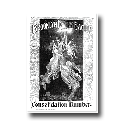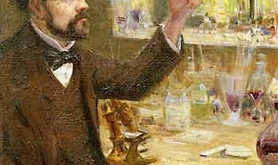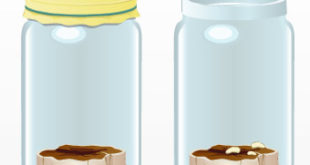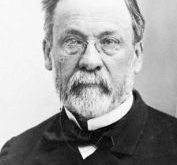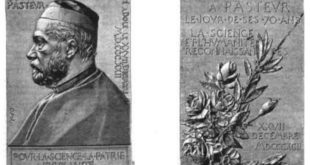(Correspondence of the Eagle.)
Eagle Paris Bureau, October 6 – Had Pasteur seriously thought about if it is probable that he, in his will, would have forbidden the funeral, which equaled in grandeur those of Victor Hugo, MacMahon and Carnot, for he was as modest as he was great. In this age of advertisement and show it does no good to read and write about a man who refused both. Outside of this laboratories his tall figure, his modest gait, his case whose expression was that of great timidity, passed by unnoticed. He never mingled with the throng at great rejoicings or at national mournings, and no one was able to say, “There goes Pasteur,” as other national celebrities were singled out. In his retirement, he resembled those philosophers and students of old who spent their lives in a small circle within the wide world, ignoring all things but that of a great invention, of a great discovery, which would benefit the universe and which may take a lifetime to bring to light.
Pasteur, like many other great Frenchmen, was born in the eastern part of France, where simplicity of living, where work is still the great motor of life and where patriotism and family life have not yet become vain words. Son of a tanner, he only had the usual advantages of an education, but like the sons of America, hardships, whetting energy, he labored with the more (unreadable) that he found obstacles in his way, and it was this severe discipline of mind that enabled him to solve problems which revolutionized chemistry, medicine and hygiene, after having spent almost half his lifetime in narrow and special studies.
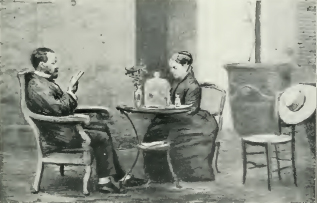
The patriarchal way in which he lived also contributed much to his scientific researches and success. Seven years before his scientific reputation had called him to Paris, while he was professor of chemistry in the faculty of Strasburg, he married the daughter of the rector of the academy. Before their arrival in Paris, a son was born to them, who is now chief secretary of the French legation in Madrid. Four girls were born in the Rue D’Ulm, where Pasteur lived many years. Three of the daughters died, and the remaining one married the well known author, M. Rene Vallery-Radot, who put all his heart and brain in the little book he wrote about his father-in-law,” L’Histoire d’un savant par un ignorant.”
In the sanctity of his home he always found the consolation and encouragement that are indispensable to a life whose labors are necessarily filled with temporary disappointments, failures and brain fatigue. In all trials, his devoted wife was by his side, and with the comforts, the joys of home, soothed the fevered brain, while with her great intelligence and tact she oftentimes breathed perseverance, which at last crowned long, tedious work with success.
On his last visit to the small town of Arbois, his birthplace, when, against his will, the natives carried him in triumph to the house in which he was born, and the loud buzzes filled the air of his compatriots, who looked up him as a god, he, in his great modesty, gave all honor to his old parents, to his country, and, in a sort of last testament, he pronounced the following words:
“Oh, my father and my mother, ye dear ones who have passed out of the world, it is to you that I owe all, to you who have lived in this little modest house. Thou, my mother, gave me the enthusiasm which leads to perseverance and success. If I have always considered the greatness of science and the greatness of my country as one it was because I was impregnated with the sentiments with which you inspired me. And thou, my father, thy life has been as hard as thy hard daily work; thou, too, hast shown me what comes of long repeated efforts. I owe to thee the tenacity of daily work. Not only dist thou have the persevering qualities which are necessary to useful lives but thou hadst also an innate admiration of great men and great deeds. To look on high, to learn of the beyond, to become greater and greater, that is what thou hast taught me. I see thee still, after the day’s work in the stillness of the evening, reading of some great battle which thou was a witness. As thou taught me to read thou taught me the greatness of my country. Be thrice blessed, my beloved mother and father, for ye are the cause of this great honor showered upon me to-day.”
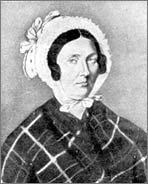 Louis Pasteur’s Mother’ | 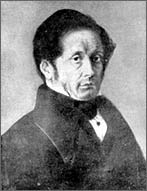 Louis Pasteur’s Father |
Renan has truly said that Pasteur’s scientific life was “a long luminous line in the darkness of the infinitely small.” In 1881 Lannelongue, a noted surgeon, called Pasteur’s attention to a child in the hospital who had died of hydrophobia. The scientist at once began to study the propagation of that horrible disease which had remained incurable. After several years of study upon inoculated animals in 1885 he performed the operation upon a human being, which remained celebrated in the annals of medicine. The shepard Jupale, bitten by a mad dog, was inoculated and he was radically cured.
The discovery once made, money was necessary to (unreadable). A national (unreadable) was made which brought over ($unreadable). The Institut de la rue (unreadable) was established and to-day an average of fifty persons come daily to be treated. Mr. Pasteur did not stop at hydrophobia. According to the principle of progress that inspired him all his life, he extended the studies of microbiology, both normal and pathological to its applications; hygiene and to medicine. And from that (unreadable) a small army of French and foreign doctors were grouped about the master to make new researches which he had so happily inspired.
For some years Pasteur was struck with palsy and its consequences being partial paralysis, his friends feared that his faculties would be affected. But such was not the case: his mind remained as clear as ever. Indeed it was during his malady that he made his most important studies and discoveries. For the past three years, however, half his body became paralyzed and his larynx became so affected that he could with difficulty articulate a word. It was only the members of his family which could understand the movements of his lips. But almost daily he visited his laboratories and still applied himself to work. Carried on a stretcher, the impotent flesh was made still subservient to the mind, which, to the last moment remained clear.
The last joy of the worker for the good of humanity was the discovery of the vaccine for croup. M. Roux had always been his favorite pupil and as he considered him his son of science, it was as if he himself or at least part of himself, had arrived at the great result. It is known that the large sums subscribed in the Figaro enabled the Pasteur Institute to establish new laboratories for the serum and to constantly keep a hundred horses on hand for its manufacture. A letter, which Pasteur addressed in the paper, will show his abnegation, his greatness of heart and his true appreciation of what other did to aid him in his work.
“You have proclaimed the immense work done by my collaborator M. Roux: you have asked mothers to contribute to the diffusion of a method which will save thousands of children from death. Not only has your appeal been heard, but it was the children themselves who have (unreadable) the lists of (unreadable). They helped the world with a good action. Parents who mourn for their little ones have (unreadable) to the salvation of those who still live. I thank you in the name of all my collaborators who work for the sake of science, humanity and country.”
Pasteur, who devoted his life to working for suffering humanity in general, was a great patriot, a great lover of country. The following act may be blamed by those whose broad feeling for humanity (unreadable) the world rather than the confines of one’s own country. Before the war Pasteur had been elected corresponding member of Bonn university, and during the conflict, while the Prussians were bombarding Paris and destroying the precious (unreadable) of science in the museum and Jardin des Tuileries, Pasteur sent back his diploma, and in answer he revised the following lines:
“The Bonn university sends M. Pasteur expression of its most profound disdain.”
The French nation has not applauded any of Pasteur’s admirable discoveries more than that act of patriotism, and during the festivities of the opening of the canal of Kiel several patriots, among them Francois (unreadable) proposed, in opposition to the participation of the German rejoicings, to make a manifestation in favor of the patriot. Pasteur, in which all those who would cold participate. It was suggested that the manifestations would take place at the foot of the statue of Strasburg and then in rue Dutot to acclaim Pasteur. Already a hundred thousand men had declared their intention of forming a colossal procession. But Pasteur very sensibly sent the following letter to the leaders of the project:
“I am exceedingly touched with the sentiments you wish to express. But I beg you leave what I have done in its simple character. I refuse all manifestations, all subscriptions.”
In reference to the Pasteur Institute and to Pasteur’s disciples, the Figaro touchingly writes that the death of the chief will bring no change. It can be said that the work of the great man will be kept up, and that his death is like that of a saint, who is called to heaven after having found an order. And it indeed can be called an order, for the institute is composed of pious, honest men in science, Benedictines or missionaries who work without ceasing in their laboratories to carry help and salvation to pestilential countries.
A collective interest reigns in this Institute. Everyone is more jealous of the reputation of the establishment than his own. They do not know rivalries nor jealousies. They do not know what thirst for gold means. M. Duclaux, the under director of the institute, was allotted a salary of $800 by the state and leaves $200 of it to the refectory of the young students. M. Roux’s salary, before the discovery of the croup serum was $1,400. It afterward was raised to $2,000. He consented to accept the augmentation, but has thrown the surplus into the general funds. All the Pasteur disciples, in their ambition and fervor to be followers of their master in characteristics of work and mind, have ended in having physical points of resemblance. Men who live in the neighborhood of the institute have now learned to distinguish them from other men.
Pasteur Institute, in rue Dutot, will continue to be the chief establishment, while branches will spread to all parts of the world. Without contest M. Duclaux of the Academy of Sciences, professor of chemical biology at the Sorbonne and under director of Pasteur Institute, will be proclaimed general director and M. Roux, whether he be willing or not, will be prevailed upon to accept M. Duclaux’s present position.
Contrary to what has been said and written, that is that Pasteur possessed several mansions which deserved the name of chateaus, the three houses he has lived in for many years are most modest in appearance and most simple in appointments. He became owner of the humble home of his youth and next to it he build a most modest house in which he established a laboratory. There he was pleased to remain for a few weeks every year, for a rest from Paris, but not to rest from labor. His city home in rue Dutot looks like the simple pied a terre of a man who does not wish to divert his thoughts with anything that might be foreign to his life work. It only consists of a few rooms adherent to the great work shop, where students ceaselessly labor in extending the master’s discoveries or elaborating new ones.
Finally, when the state gave him grounds and a house called Villeneuve-l’Etang, near Carches, he simply furnished a few rooms to be near the laboratories and the stables, where the horses which furnish the serum are kept. Pasteur died in Villeneuve-l’Etang.
Do you wish to have a look at this benefactor of humanity resting in the last place before he was taken to his grave? You mount plain wooden steps which lead to plainly furnished rooms. You are asked to enter the dining room, the inventory of which will surprise those who sacrifice everything for the artistic and luxuries of life. A plain sideboard, one of a dozen, bought in some third class furnishing store; table and chairs to match. The only object worth looking at is a bust of the master ornamenting the mantelpiece. There you meet all of Pasteur’s disciples, who for the first time seem to be before an insolvable, painful problem. What would they not give for the secret of resuscitating the dead! It is Pasteur’s son that tearfully and mournfully takes you to the master’s bedroom in which he lies. Here again the greatest simplicity reigns. A wooden bedstead, a few chairs, all that appertains to a bedroom. But that is not what you have come for to see. On the bed, as if in repose, lies the master. His small hands are crossed on his breast and a crucifix lies in them. He died a Catholic, a Christian, and all believers are able to cross themselves and the dead with holy water that stands by. He lies there as if asleep. His beard is white, but his hair is only mixed thickly with silver. Goodness, gentleness, even modesty are still painted on that quiet, reposed countenance. And while looking upon him you quote the Lord’s words: “He is not dead, but sleepeth.” Dead? No; he remains forever immortal in his work. To be a benefactor of suffering humanity is a greater glory than to be a conqueror of a world, or a discoverer of the worlds in the heavens, for to do good is the only thing that is worthy of a record. EMMA BULLET.
 Pasteur Brewing Louis Pasteur – Science, Health, and Brewing
Pasteur Brewing Louis Pasteur – Science, Health, and Brewing 